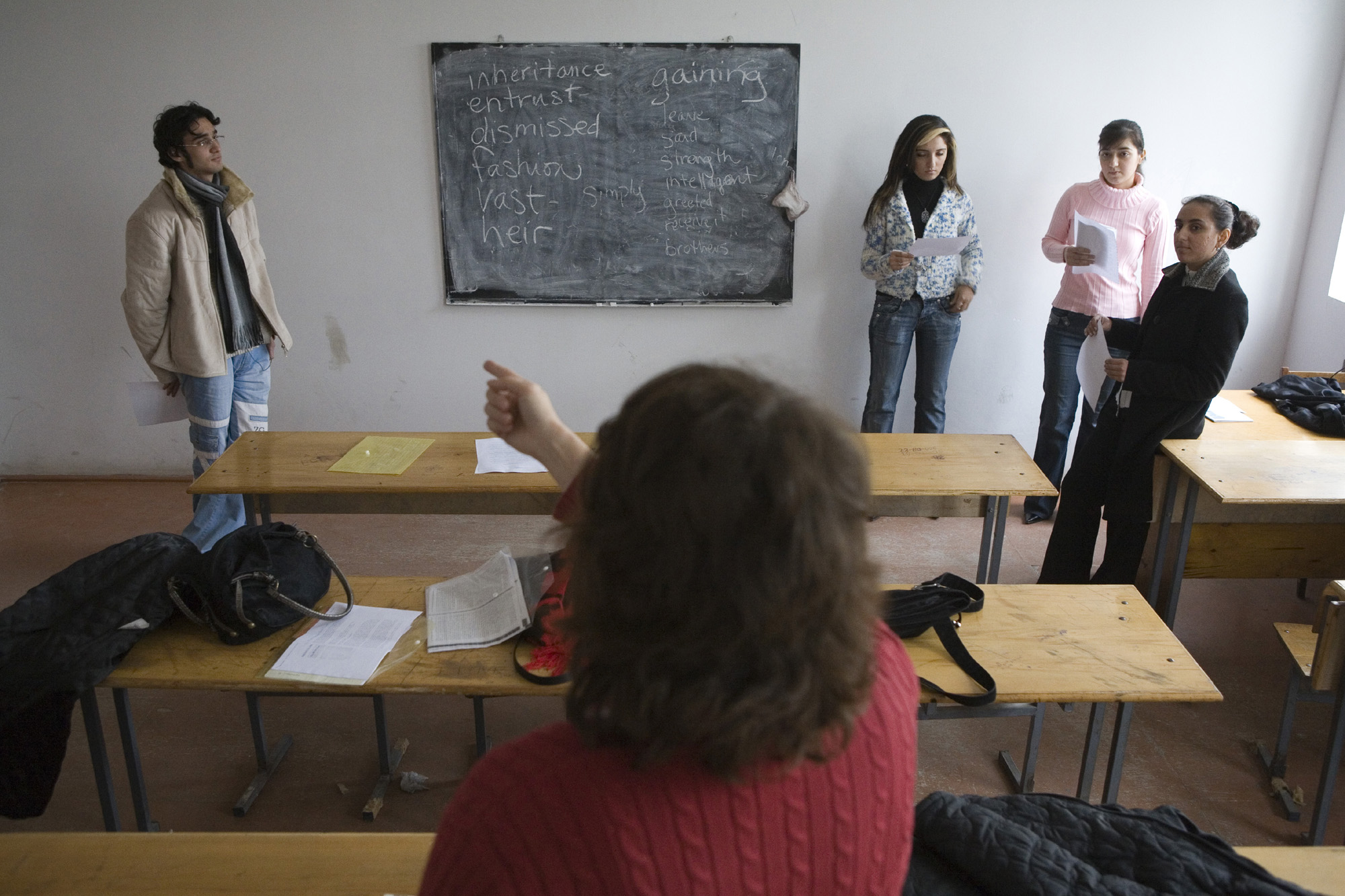
EDITORS’ NOTE: This year’s Week of Prayer for International Missions, Dec. 2-9, focuses on missionaries who serve in the former Soviet Union as well as churches partnering with them, exemplifying the global outreach supported by Southern Baptists’ gifts to the Lottie Moon Christmas Offering.
CENTRAL ASIA (BP)–Chalk races across a blackboard as Anne-Marie Bennett* struggles to keep pace with her students. The names are coming quickly now -– Napoleon, Washington, Stalin. She has asked her class to list the world’s greatest leaders, and they have plenty of suggestions.
But the 37-year-old Southern Baptist worker’s next question is more telling.
“Between wealth, intelligence, strength and love, which is most important in a leader?” Bennett asks. She assigns a trait to each corner of the room and tells her students to move to the one they would pick. Once the shuffle is finished, only the “love” corner remains empty.
The exercise is part of the morality-based curriculum Bennett uses to teach English and share Jesus with university students in the former Soviet Union. It’s also a clue to the overwhelming lostness that consumes the central Asian nation where she ministers. Fewer than 2 percent of Bennett’s people group identify themselves as evangelical Christians. Most are Muslim, though decades of communist rule ground their Islamic faith to a thin veneer.
“They’re Muslim because they’re told they’re Muslim,” says Tom Sterling,* a Southern Baptist worker who serves with Bennett. “Most haven’t read the Koran, but they’ll tell you that’s what they believe in.”
Above Allah, many in this post-Soviet nation worship affluence. Here, what you have is more important than what you believe. From designer clothes to high-rise apartments, looking good and living well matter.
Indeed, it’s the prospect of bigger paychecks that attracts many of Bennett’s students. Elshad*, 17, is one of them. Clean-cut and energetic, the college freshman studies toward a career in the country’s lucrative oil industry. Bennett says fluent English skills instantly can propel students like Elshad into the upper-middle class.
But with materialism also comes corruption. Students sometimes bribe professors for passing grades; police extort money from those they are supposed to protect. Other problems abound, too. War forced many from their homes, leaving thousands displaced. Others wrestle with dubious job security following the Soviet Union’s demise in the early 1990s. Unborn babies are routinely aborted as a substitute for birth control.
“There’s just a sadness,” Bennett says. “And if there’s not a sadness, there’s a hardness. People grasp for anything they can reach. And if [Christians] are not here to stand in the gap, what are they reaching for?”
Bennett prays the answer will be Christ. Her goal is to see new churches spring up across the country, starting with her students. But it can’t happen without the chance to share the Gospel, and Bennett uses English as a tool to create that opportunity.
She’s dubbed her classes “conversation clubs” for a reason. There’s no mention of dangling participles or diagramming sentences. Instead, students simply do a lot of talking. The idea is to practice and polish conversational English, building on language basics learned in earlier grades. A morality-based curriculum helps Bennett steer classroom conversations -– and ultimately students’ thoughts -– toward values and ethics, even faith.
ONGOING INTERACTION
But the conversations don’t end when the bell rings. Bennett’s ministry depends on opportunities to build relationships by interacting with students outside the classroom. Class field trips are regular events and give Bennett time to share her faith.
No matter how deeply a spiritual conversation may delve, these kinds of witnessing opportunities aren’t silver bullets. Most of the students Bennett has helped lead to the Lord accepted Jesus only after repeated exposure to the Gospel.
Her own salvation experience enables Bennett to empathize with students’ issues with Christianity. Raised in a non-believing family, Bennett gave her life to Christ in college thanks to a friend who frequently invited her to church. Bennett says it’s amazing how the Lord has given her common ground with the people He has called her to serve.
Despite such blessings, Bennett’s ministry isn’t a string of success stories. She also has endured bitter disappointment while serving in this former Soviet Union nation.
Four years ago, Bennett remembers standing on a beach as two of her students were dipped beneath the frigid waters of the Caspian Sea. Their baptisms were among the first fruits of a newborn church Bennett helped start in her home. Afterward, the band of believers held their first Lord’s Supper.
“When everyone left that evening, God’s peace rested on my house,” she remembers. “And it was so beautiful and marvelous…. But that was then.”
Soon the fledgling church began to fizzle. Within two years the congregation finally collapsed.
“Everything I had seen, understood and been a part of was basically falling apart,” she recounts. “It caused me to wonder about God. Not that He wasn’t sovereign; not that He couldn’t or wouldn’t work through this; but to wonder what He was about to do.”
In that moment of despair, Bennett says the Lord threw her a life preserver –- Isaiah 43:18-19a: “Forget the former things. Do not dwell on the past. See, I am doing a new thing….” The verses gave Bennett courage to move on and learn from her mistakes.
“You can’t shortcut the system for seeing fruit,” she says. “I made a greenhouse and wanted to see something grow quickly, and it did. But you can’t keep the plant in the greenhouse forever…. One day it has to come out.”
Bennett adds that she made a conscious decision to step back from the church as it crumbled, knowing it needed to thrive, or die, on its own.
“I could have come in with Elmer’s glue and bandages and repaired it, and it would still be limping along,” she says. “If they want to gather again, they have the tools, understanding and discipleship behind them to do that. Perhaps one day they will…. I have hope for that [church reorganizing].”
Bennett is not allowing past failures to diminish her passion for seeing students come to Christ. She is busy rebuilding her ministry. She says God has already blessed her with a core group of students with whom she’s forged solid relationships.
“I’m praying for a few people who will say, ‘We want to be discipled,'” she says. “I love working with students; I love sharing Jesus with them. I love planting those seeds and watching them grow.”
–30–
*Names changed for security reasons. Don Graham is a writer for the Southern Baptist International Mission Board.

















